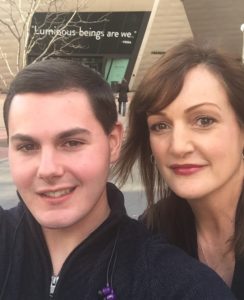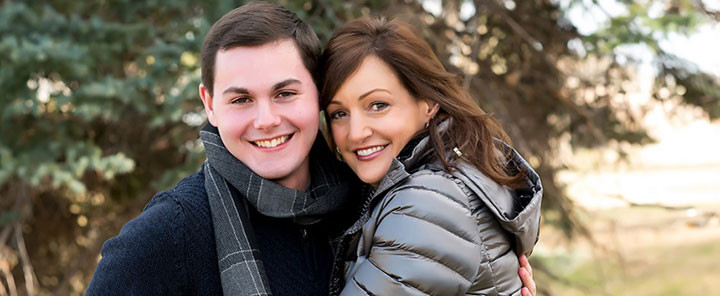Karolyn: Dr. Momma Bear
The views and opinions expressed in following story are those of the author and do not necessarily reflect the opinions of Mental Health Colorado.
What I most want to convey about this brief video is this: Jacob is OK. Hope, love, and kindness got us to the other side. My deepest gratitude for the unconditional love of family, friends, teachers, medical providers, counselors, neighbors, our rabbi and spiritual community. For the support of work colleagues, kind strangers, compassionate policemen, judges, probation officers, social workers and his guardian ad litem. And of course, Roxy and Cyrus, our family labradoodles, that surrounded and protected, and always knew when they were needed.
 Families like ours – raising children with mental health issues, often shaken by divorce, raising more than one child, and trying to navigate costly medical systems that do not always respond in times of crisis – need a lot of support. It takes a VILLAGE. It really truly does.
Families like ours – raising children with mental health issues, often shaken by divorce, raising more than one child, and trying to navigate costly medical systems that do not always respond in times of crisis – need a lot of support. It takes a VILLAGE. It really truly does.
We must not be afraid to ask for help. We must not be afraid of stigma. And we must find a way to care for ourselves so that we can care for our loved ones who are suffering. I think it goes without saying that it’s really challenging to juggle all of these demands as a single parent. We are not meant to go it alone and we need to remember this.
So when we feel let down by the medical system, when we find gaps in care and crisis stabilization, we need to be brave and call upon the support of our “village” more than ever. We must challenge ourselves to view these experiences, not as failures, but as opportunities for change. A CALL TO ACTION.
It’s time to drop the “mental” in mental health and recognize these brain conditions for what they are: a health issue with a biologic basis, worthy of the same research dollars, legislative support and advocacy efforts as other medical conditions. Why? Because this is an epidemic that touches everyone.
It’s time for our communities to increase their awareness and notice who amongst us, in our neighborhoods, in our schools, in our places of worship, is suffering. Reach out to them. Because if they are suffering, I promise you, their family is suffering. Every kind word, every “how are you doing, buddy?,” every thoughtful note, gesture, smile, pat on the back, handshake, and hug, says this: “I see you.” And isn’t that what we all want? To be seen, to be known, to be loved. Unconditionally.
— Karolyn Kabir
———————————————————–
DONATE TO MENTAL HEALTH COLORADO
More than 500,000 Coloradans lack the mental health care they need. You can change that. For more than 60 years, Mental Health Colorado has led the charge in promoting mental health, ending stigma, and ensuring equitable access to mental health and substance use services. It’s life-changing work. Your contribution makes it possible.



